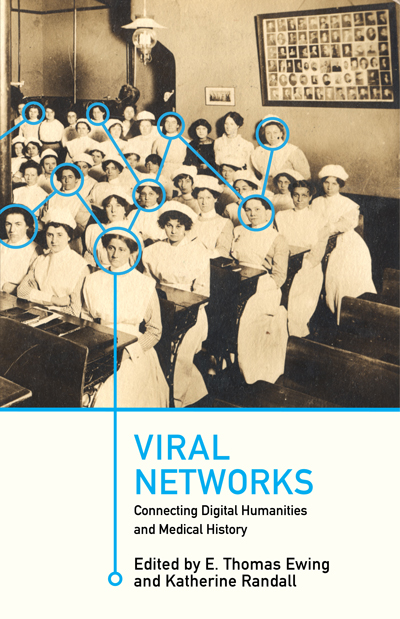JARS v62n2 - More Variegated Rhododendrons
More Variegated Rhododendrons
Walter Schmalscheidt
Oldenburg, Germany
There exist more noteworthy rhododendrons with variegated leaves than listed by Mr. Kenneth Cox in his report "Variegated Leaved Rhododendrons & Azaleas" in the Winter 2007 issue of the ARS Journal. With this article I will add to his list.
'Blattgold' *
'Blattgold' is probably one of the best variegated rhododendrons for the moment as far as I know, hardy to nearly -18°C. It is a sport of 'Goldflimmer' discovered in 1988 by Mr. Klaus Stöckmann, owner of the Ernst Stöckmann Nursery at Bad Zwischenahn, Germany, and introduced in 1996. 'Blattgold' was for the first time exhibited in 1994 at the show "Rhodo 94" at Westerstede under the provisional name 'Golden Flimmer'. Flowers are lilac, with small yellow markings on the dorsal lobe arranged in rounded trusses of 10-15, with the diameter of flower 4.5-6.0cm. Leaves are very striking yellow, much more yellow than those of 'Goldflimmer'. It needs slight protection in winter.
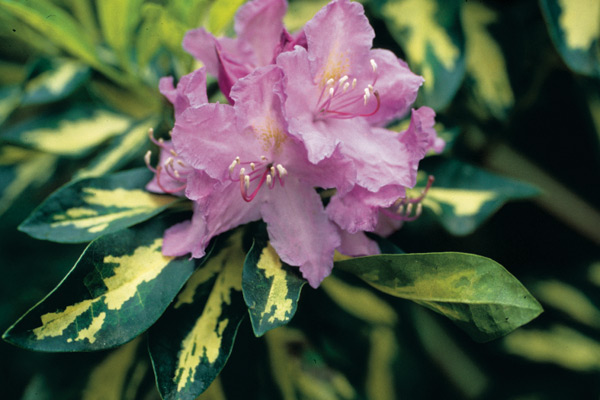
|
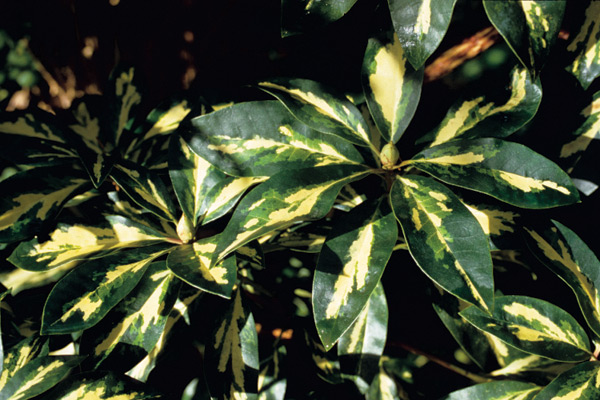
|
|
|
'Blattgold'
Photo by Walter Schmalscheidt |
'Blattgold'
Photo by Walter Schmalscheidt |
'Carolina Spring' *
'Carolina Spring' is a sport of 'Catawbiense Boursault' selected by L.Q. Thomasson, owner of the Thomasson Nursery, Hamptonville, North Carolina, USA, in July 1985. In April 1996 I got a little grafting material of 'Carolina Spring' from Mr. Ron Rabideau, a member of the Massachusetts Chapter of the ARS. The leaves of this novelty are elliptic to oblong, 4-13cm long, 1.5-3.5cm broad, dark green variegated irregularly with yellowish to cream coloured stripes or blotches. Flowers are open-funnel-campanulate, lavender, with inconspicuous yellowish to green spots on the dorsal lobe. Thirteen to seventeen flowers are exhibited in loose trusses. The flower diameter is 4-5.5cm. Growth habit is broad and rounded, and 10-year-old plants are approximately 120cm high and 150cm broad. Flowering time begins about 20 May and finishes about 5 June. Hardiness is to -24°C under German conditions. Plants grow best in partial sun to shaded sites. It is one of the best variegated rhododendrons and looks very striking.
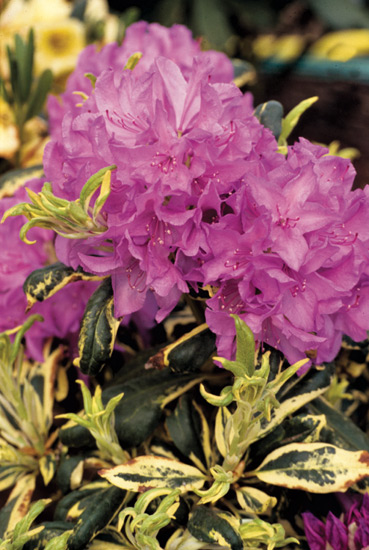
|
|
'Carolina Spring'
Photo by Holger Hachmann |
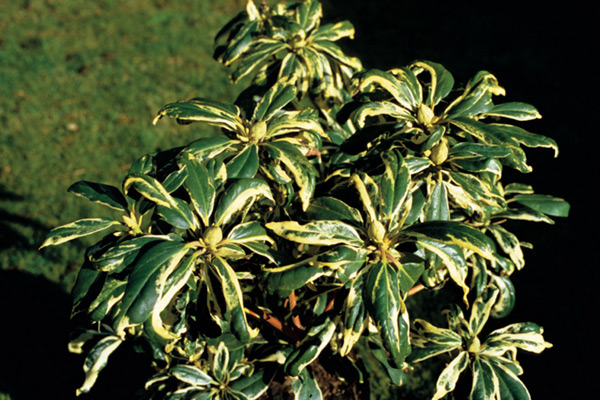
|
|
'Carolina Spring'
Photo by Walter Schmalscheidt |
'Goldblattambiente'
'Goldblattambiente', a further variety of Germany, was bred and named by Henry Hesse and arose in 1992 from a cross of 'Rotbäckchen' X 'Tivoli'. Its leaves are dark green above, with golden yellow mottled variegation. Flowers are slight pink-white, with darker margins and strong dark red marking on the dorsal lobe, ageing to nearly white. Nine to nineteen flowers - diameter of flower 3.5-7cm - are together in slightly loose, rounded to pyramidal trusses. The original plant, which the breeder lost, formed a shrub of 35cm in height and 35cm in width in six years. Grafted plants in four years reach a height of 42cm by 38cm in width. It is hardy to -20°C and registered by W. Schmalscheidt.
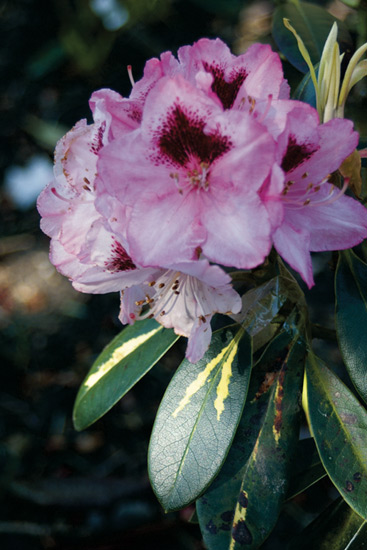
|
|
'Goldblattambiente'
Photo by Henry Hesse |
'Goldsaum'
'Goldsaum', a brand new novelty introduced to commerce in spring 2006 by the German nursery Gerold Coners at Westerstede-Moorburg, looks very promising. This cultivar is a chance seedling and originated in 1994 in the Netherlands in the nursery of Guus Nous at Zundert. One parent was obviously R. degronianum ssp. yakushimanum . Flowers are light pink lilac shading to nearly white in the centre, with small green marks on the upper lobe in full rounded trusses of 11-19, with the diameter of the flower 4-6cm. Leaves are elliptic to narrowly elliptic with striking yellow variegation. It is hardy to nearly -20°C and buds as a young plant of 20cm in height. It was named and registered by W. Schmalscheidt.
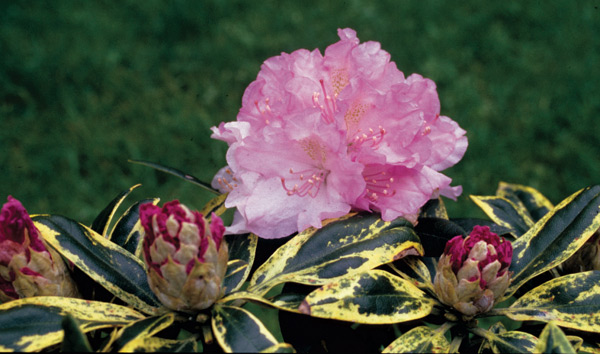
|
|
'Goldsaum'
Photo by Walter Schmalscheidt |
'Goldsprenkel'
'Goldsprenkel' comes from the Botanical Garden at Dortmund. This cultivar originated there pre-1950 and was planted about 1950 from the former Direktor Richard Nose. Under the wrong name 'President Roosevelt' I got this variety in spring 1979. Its parentage is unknown, but judging from its appearance it is clearly a sport of 'Album Novum' with yellow mottled leaves and white, pale lilac-tinged flowers, with green-yellow or brown-yellow markings less striking than 'President Roosevelt' but winter hardy to at least -24°C or probably more. 'Goldsprenkel' forms full bushy plants, named and registered by W. Schmalscheidt.
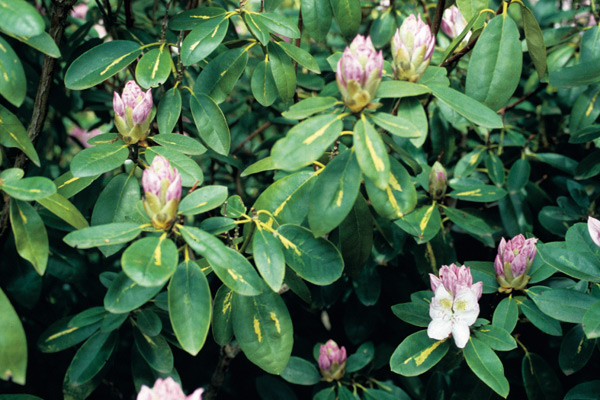
|
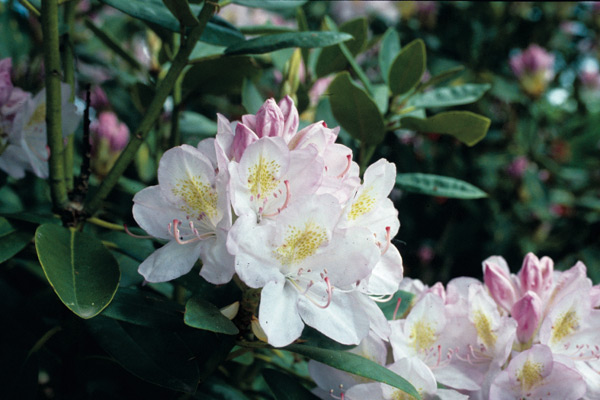
|
|
|
'Goldsprenkel'
Photo by Walter Schmalscheidt |
'Goldsprenkel'
Photo by Walter Schmalscheidt |
'Graf Bentinck' *
'Graf Bentinck' is a sport from the Hobbie hybrid 'Nippon' discovered by Mr. Hans-Georg Buchtmann at Varel in the year 1981. He named it in honor of the most important Graf (Earl) Wilhelm Gustav Friedrich von Bentinck (1762-1835) of the town Varel at Frisia, Germany. Leaves have a broad yellow-green irregularly shaped margin and a dark green centre. After twenty-five years the plants are at present 2m high, with growth habit straight upright. Flowers are light yellow with a red basal blotch like those of 'Nippon'. Time of flowering is the second half of May, but unfortunately plants are a little shy flowering. It is winter hardy to -20°C.
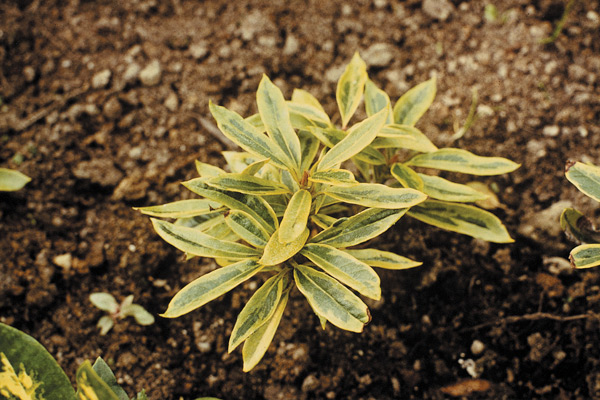
|
|
'Graf Bentinck'
Photo by Hans-Georg Buchtmann |
'Panaschiert II' *
'Panaschiert II' is a provisional name for a seedling found by Mr. Bernhard Knorr about 1992 in the Elbsandsteingebirge at Bad Schandau in Saxony, Germany. Though this has not flowered until now - the plant is fairly small - its leaves are very spectacular, mottled yellow and yellow-green especially around the main vein. In any case it seems valuable enough to be propagated because of its very striking leaves even if its flowers should be poor.
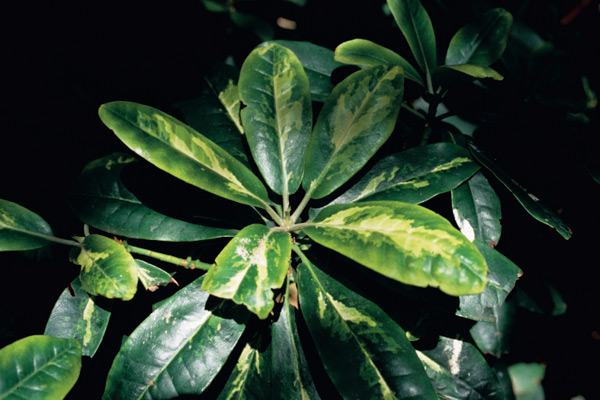
|
|
'Panaschiert II'
Photo by Walter Schmalscheidt |
'Ponticum Aureo Variegatum' *
'Ponticum Aureo Variegatum' was already in culture in 1861 under the name "ponticum foliis aureo-variegatum." As the picture clearly shows there are striking yellow streaks near the main vein of the leaves, while its margins are simply green and not bold yellow as Mr. Cox wrote. Flowers are fairly small, between 3.0-4.5cm in diameter, lilac towards the centre paler with a yellow blotch on the upper lobe. Hardiness is only moderate - to about -16°C.
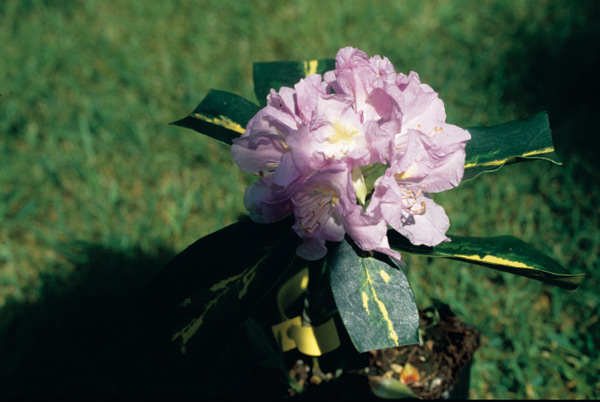
|
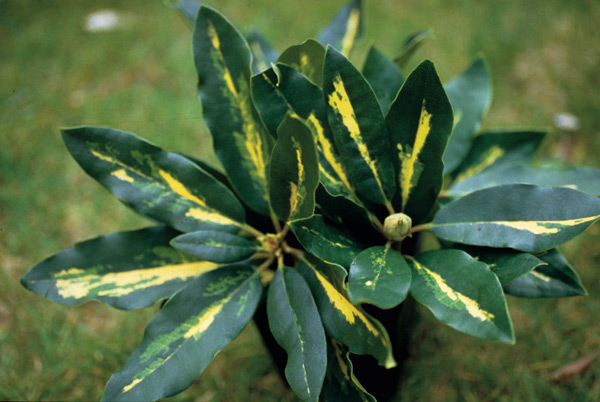
|
|
|
'Ponticum Aureo Variegatum'
Photo by Walter Schmalscheidt |
'Ponticum Aureo Variegatum'
Photo by Walter Schmalscheidt |
Sport of 'Roseum Elegans' *
A number of years ago in December 1998 a young nurseryman, who has since died, presented me a sport of 'Roseum Elegans' with yellow variegated leaves, which seems very promising. The flowers possess the same colour as those of 'Roseum Elegans'. Because of a long drought in the year 2006 the plant did not set flower buds, but the colour picture of the leaves demonstrates clearly that this is an interesting plant.
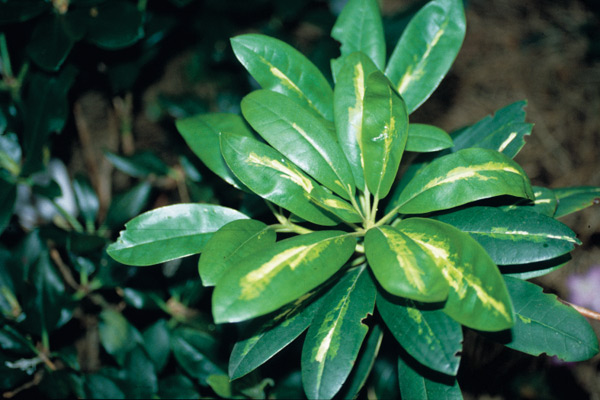
|
|
'Roseum Elegans' sport
Photo by Walter Schmalscheidt |
'Sunsplash' *
'Sunsplash' - also written 'Sun Splash' - is of American origin. Its parentage and breeder are unknown. According to The International Rhododendron Register and Checklist, second edition 2004, it was introduced by Whitney Gardens in 1991. But Roslyn Nursery offered it also in their 1991 catalogue. In spring 1992 I obtained some scions from Whitney Gardens & Nursery. My plants have now reached 2m in height, with growth upright and spreading. Each dark olive green leaf is variegated with gold coloured irregularly shaped leaf markings. The flowers are purplish-lilac, with red markings on white underground on the upper lobe and margin waved. The truss is rounded, fairly full, with nine to seventeen flowers and with the diameter of the flower 4.5-6cm. Flowering time is late May. It is cold hardy to -26°C, one of the best for cold areas.
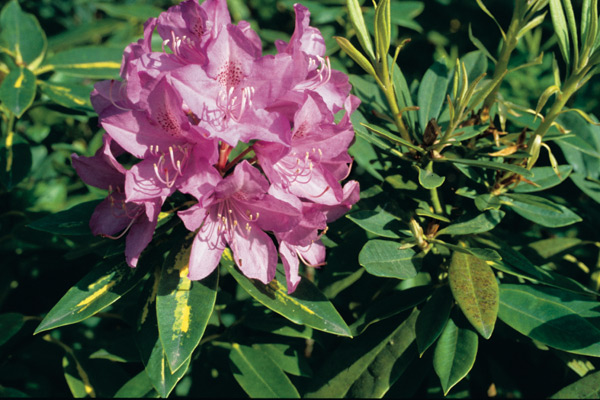
|
|
'Sunsplash'
Photo by Walter Schmalscheidt |
'Superflimmer' *
'Superflimmer', a sport of 'Goldflimmer' of American origin, is listed in the 2007 catalogue of Whitney Gardens & Nursery together with an impressive colour picture. It looks like 'Blattgold'. Whitney Gardens state: "This sport is the ultimate in variegated foliage." The ball-shaped lavender flowers with reddish brown freckling are exactly the same as those of 'Goldflimmer'. But in opposition to 'Goldflimmer' it reverts less often to non-variegated foliage. However, it is just as vigorous as 'Goldflimmer', roots easily and tolerates the same amount of sun, while its hardiness reaches to -20°C. Stuart Imrie, Sumner, Washington, found this novelty.
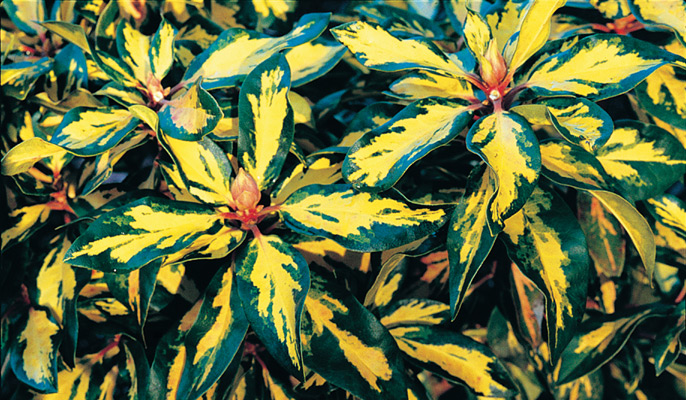
|
|
'Superflimmer'
Photo courtesy of Whitney Gardens and Nursery |
'Variegated Unique' *
'Variegated Unique' 1 , also of American origin, is offered by Whitney Gardens & Nursery in their 2007 catalogue, a variety with quite unusual creamy white variegation on the wavy-edged leaf margins. Leaves are partly strangely sinuated as those of oaks. Plant growth is upright and well-branching to 3 feet in ten years. The ball-shaped flowers are of blush pink colour, with golden yellow freckling. This variety is stable, and old plants do not revert back to green leaves. It also comes from Stuart T. Imrie.
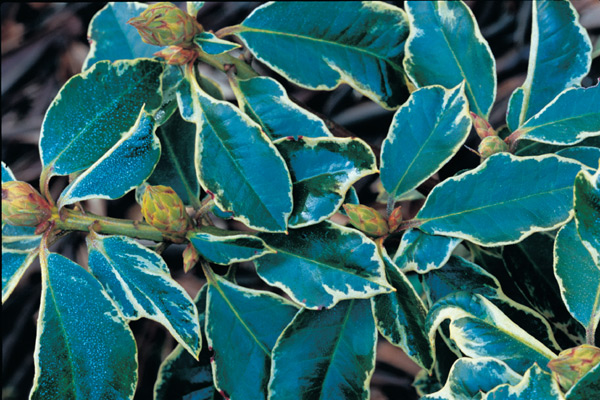
|
|
'Variegated Unique'
Photo courtesy of Whitney Gardens and Nursery |
There may be still more rhododendrons with variegated leaves, but who does know all these? Nobody, I think.
References
Bilderback, T.E., L.Q. Thomasson, Paul R. Fantz. 1992. 'Carolina Spring' rhododendron. Hort Science Vol. 27(4):378-379.
Leslie, A.C. compiled 2004. The International Rhododendron Register and Checklist , Second Edition. London: RHS.
Leslie, A.C. compiled 2004. The International Rhododendron Register and Checklist , Second Supplement 2007. London: RHS.
Schmalscheidt, W. 1991. Rhododendron und Azaleenzüchtung in Deutschland Teil II (1930-1990) zweite neubearbeitete und erweiterte Auflage. (Verlag Gartenbild Heinz Hansmann, 3260 Rinteln 1).
Whitney Gardens & Nursery. 2007. Catalogue for the Year 2007.
Acknowledgements
I thank Kathy Van Veen of the Van Veen Nursery for her support with information.
* Name is unregistered.
Editor's Note
1 Kenneth Cox from Glendoick in Scotland reports that he has a variegated 'Unique' he calls 'Buckland Unique'* found at Buckland Abbey, a garden in Devon, England. It may or may not be the same plant as 'Variegated Unique'. It has a pale yellow rim around the leaf.
